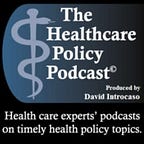Since suicides serve as a proxy measure for social isolation and loneliness (SIL), last week the CDC reported after declines in 2019 and 2020, suicides increased 7% in ‘21, particularly among those 25-44, to 48,343 returning their peak in 2018. Over the past 2 decades suicides have increased 30%, they are now is the 12th leading cause of death. Also in 2021, the CDC’s most recent bi-annual Youth Risk Beh Survey, published this past November, found among other things teenage girls experienced persistent sadness at twice the rate of teen boys and three in five teenage girls reported being persistently sad or hopeless, a 60% increase compared to a decade earlier. The survey also found 30% of teenage girls had also seriously considered attempting suicide, up nearly 60% from 2011. Frequent listeners are aware in June 2021 I had related conversations with Brian Alexander regarding his book “The Hospital,” discussed deaths or despair in November 2021 with U of Maryland’s Prof. Carol Graham, published a related piece in December 2021 subtitled “the unrecognized tragedy of working class immiseration,” discussed with psychiatrist, Dr. Lise van Susteren, related climate crisis health effects last March and in December with Susan Linn related issues she raises in her book "Who’s Raising the Kids.”
The 33-minute interview begins by Prof Holt-Lunstad defining social isolation and loneliness, the magnitude of the problem, i.e., and the causes thereof. To what extent SIL is recognized and addressed in the clinical practice setting, discusses the need for core objectives and for SIL measuring and benchmarking SIL, SIL among clinicians and other medical professionals, discusses related efforts by the Administration for Community Living and the World Health Organizations, what the healthcare insurance industry is doing to address SIL, and offers comments for family caregivers regarding SIL.
Julianne Holt-Lunstad, Ph.D., is a professor of psychology and neuroscience at Brigham Young University, where she was recently named the Martin B Hickman Outstanding Scholar and is also the director of the social neuroscience lab. She also has an adjunct professorship at Iverson Health Innovation Research Institute Swinburne University of Technology; Melbourne, Australia; and the founding Scientific Chair for the US Coalition to End Social Isolation and Loneliness and the Foundation for Social Connection. Prof Holt-Lunstad has provided expert testimony in a US Congressional Hearing, expert recommendations for the US Surgeon General Emotional Well-Being in America Initiative, served as a member of the scientific advisory committee for the UK Cross Departmental Loneliness Team, and a member of a National Academy of Sciences Engineering & Medicine consensus committee, and the US Administration for Community Living. She has been awarded the George A. Miller Award from the American Psychological Association, Karl G. Maeser Distinguished Faculty Research Award, Mary Lou Fulton Young Scholar Award, Marjorie Pay Hinkley Endowed Chair Research Award from BYU, and is a Fellow for the Association of Psychological Science and American Psychological Association.
Prof. Holt-Lunstad's SIL review published last year in the Annual Review of Public Health, discussed during this interview, is at: https://www.annualreviews.org/doi/abs/10.1146/annurev-publhealth-052020-110732.




